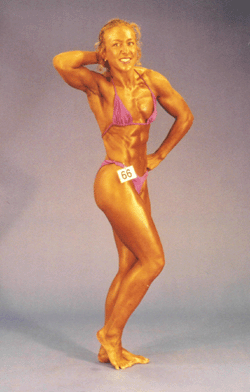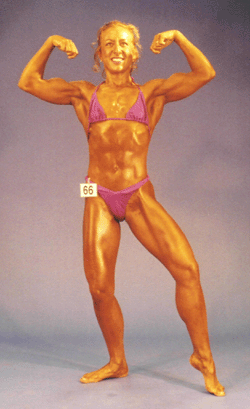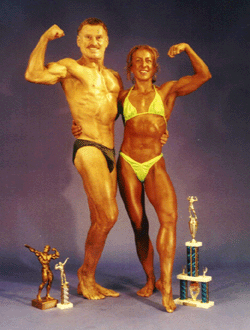
|
GREEK-AMERICAN ATHLETE COMBINES PHILOSOPHY, BODYBUILDING By Elisabeth Herschbach |
Like many other aspects of the classical tradition, this ideal of a "sound mind in a sound body" continues to influence modern Western attitudes, shaping the way we think about character and education, health and human flourishing. Yet even as this ideal continues to inspire us today-- a simple internet search of the phrase "sound mind in a sound body" will turn up a considerable list of schools and clubs that take the ancient slogan as their motto-- our public culture seems to be moving farther away from valuing the sort of balance and proportionality that the classical Greeks admired and tried to cultivate in themselves. Those we now hail as symbols of success and suitable candidates for admiration tend not to be the well-rounded or the multi-faceted, but, rather, those who possess some monolithic talent produced by years of single-minded devotion to one pursuit or vocation: super-scientists and star-athletes, for example, whose very survival as professionals seems to impose a requirement of one-sidedness. Ours seems, increasingly, to be an age of extremes, fueled by a culture of over-specialization. Perhaps that is why it is intriguing to meet someone like Melina Constantine Bell. A former lawyer and a recent graduate of the Masters program in philosophy at Tufts University, Melina is now a PhD student in
A Greek-American by heritage and a Northeasterner by birth, Melina grew up near Hartford, Connecticut, where her family was active in the parish of St. George Greek Orthodox Cathedral. For as long as Melina can remember, there has been a tradition of athleticism in the family, encouraged by her father, Costas Theopistos Constantine. An elementary school physical education teacher by profession, Mr. Constantine is also a runner, bicyclist, swimmer, and accomplished ballroom dancer who once competed with Fred Astaire. He is also co-founder of the so-called September Games, an annual event for family and friends designed to challenge a full range of physical skills, including running, swimming, push-ups, chin-ups, sit-ups, bench press, and juggling. (Melina confesses that juggling is not her forté, but notes that she makes up for it in chin-ups!) But although she has always shared her father's interest in dance-- when in middle school helping him pract
Two years later-- in the fall of 1999, with a Masters degree from Tufts under her belt and a fellowship for doctoral studies at the University of Pennsylvania inhand-- Melina found herself training for her new home institution's Mr. and Ms. Penn bodybuilding contest. Under the guidance of David Sylvester, the trainer at Penn's Gimbel gym who originally encouraged her to compete for the annual contest, Melina began an intensive six week training regimen: lifting twice a day, each workout designed to exercise a single muscle group at a time, regular aerobic workouts, an exhausting series of posing exercises in which every muscle must be held taut to show its full definition, and a strict process of dieting requiring Melina to gradually strip down her carbohydrate consumption and reduce her daily caloric intake by 100 calories every week. Known as "carb-depletion," this brutal diet that bodybuilders impose on themselves in preparation for competition is intended to exhaust the body's supply of carbohydrates-- its preferred source of energy-- so that it is forced to burn fat instead. But it can also exhaust the body's stamina, posing the most difficult challenge to an athlete's commitment to the sport.
I asked Melina whether she plans to continue competing, even as her career in academic philosophy unfolds. Her answer was an emphatic "yes!" Eventually, she explained, she hopes to get her Pro card, which would allow her to compete in Ms. Olympia, the women's counterpart to the world-class Mr. Olympia contest made famous by Arnold Schwarzennegger. What she loves about the sport is the exhilaration of competition, the challenge of pushing herself to work harder, and the satisfaction of watching her body change shape as she sculpts her muscles through weight training. As Melina described it to me, bodybuilding is an interesting blend of athletics and artistry, a creative process of imposing form on matter--except the material in question is one's own body, and the process involves long, hard hours of pumping iron to create a shape that conforms to one's vision of an ideal set of proportions. (For example, bodybuilders aim for biceps and calves of the same circumference, and a "double V" shape formed from the shoulders to the waist and the waist to the knees.) In addition to the athletic challenge of bodybuilding, Melina also loves the sense of camaraderie that she shares with her workout partners at the gym. And while it can sometimes be difficult to reconcile her rigorous training schedule with her academic commitments, Melina usually finds that her involvement in the sport enhances rather than detracts from her experience as a student of philosophy. Her interest in bodybuilding, for example, has provoked a parallel interest in new kinds of philosophical questions-- questions, for instance, about the construction of aesthetic ideals, about cultural standards of femininity, and about the quality of life and the pursuit of value. More generally, Melina finds that her synthesis of athletic training and philosophical study gives her a sense of balance and wholeness in her life: a true blend of excellence in both mind and body. Plato would have been pleased. Elisabeth Herschbach is a doctoral candidate in Philosophy at the University of Pennsylvania.
|
|




